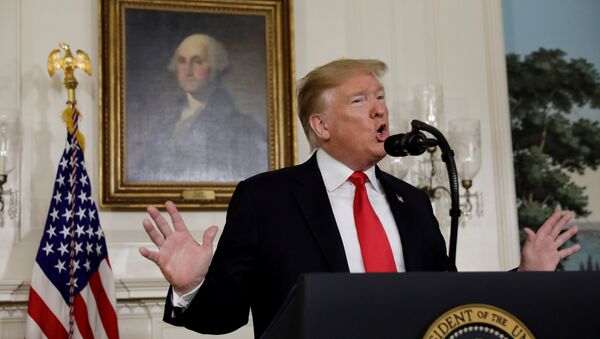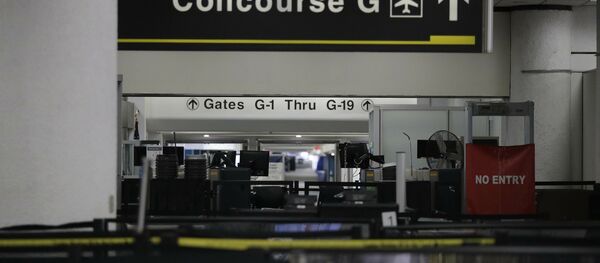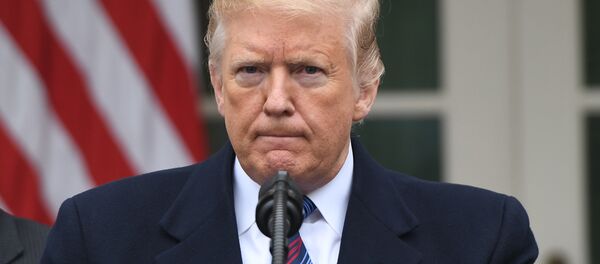Donald Trump delivered a televised address on Saturday in a bid to put an end to the month-long government shutdown and bring a compromise to the divided Congress.
Saturday's speech was largely addressed to his political rivals in the Democratic Party, who took control of the House of Representatives in the November midterm elections and challenged his tough stance on immigration.
What Did Trump Say?
The president described the US immigration system as being "badly broken for a long time", particularly due to decades-long "partisan gridlock and national neglect".
He came up with a number of immigration proposals, seeking funding for a wall on the US-Mexico border, which he had earlier said would tackle illegal immigration-related problems, such as illegal drug smuggling, human trafficking, cartel violence, and sexual assaults.
Trump's deal, which he called a "common-sense compromise", would include:
- $5.7 billion for the construction of 230 miles of a "see-through" steel barrier in "high-priority locations" on the US southern border
- $800 million in urgent humanitarian aid
- $805 million for "drug detection technology" at the Mexico border
- 2,750 more border agents and law enforcement professionals
- 75 new immigration judge teams
- a new system to allow Central American minors to apply for asylum in their home countries
- a reform to promote family reunification for unaccompanied migrant children
In exchange for the necessary funding, Trump proposed a three-year extension of protections for the nearly 700,000 recipients of the Deferred Action for Childhood Arrivals (DACA) program, commonly referred to as 'Dreamers'. Under DACA, young people who arrived in the US illegally by 2007 and were under 16 by that time are granted two-year renewable permits to work and live in the country.
READ MORE: Trump: If We Win Daca Case, We’ll be Able to Ink Deal on ‘Dreamers’, Border Wall
The DACA program was created by Barack Obama in 2012; Donald Trump, a staunch opponent of undocumented immigration, announced plans to phase it out in September 2017, but federal courts have blocked the attempt. A federal judge in Texas refused to order to halt DACA in August 2018, although he said that it was likely unlawful and predicted that the move to stop the programme would eventually succeed.
Another provision of Trump's Saturday immigration deal would include a three-year extension of temporary protected status (TPS) for 300,000 immigrants from designated countries (mostly in Central America and Africa) affected by armed conflict or natural disaster.
Senator Lindsey Graham (R-SC), who had earlier floated a similar proposal, has lauded the president's compromise.
A fantastic proposal Mr. President!
— Lindsey Graham (@LindseyGrahamSC) 19 января 2019 г.
Let's get it done! https://t.co/m8bzYGRLTw
"Compromise in divided government means that everyone can't get everything they want every time," said Senate Majority Leader Mitch McConnell. "The President's proposal reflects that. It strikes a fair compromise by incorporating priorities from both sides of the aisle."
What Was the Democrats' Reaction?
A number of high-profile Democrats were quick to refuse his "olive branch", claiming that it would not get approval among lawmakers and any discussions should be preceded by re-opening the government.
Speaker of the House Nancy Pelosi chastised Trump for bringing up previously rejected proposals, "each of which is unacceptable and in total, do not represent a good faith effort to restore certainty to people's lives". She said there was little chance of the deal passing in the House.
The Democratic House majority, Pelosi added, would pass a package of their own bills to re-open the government and pave the way for a broader discussion on border security. "The President must sign these bills to re-open government immediately and stop holding the American people hostage with this senseless shutdown," she concluded.
The senior Senator from Illinois, Dick Durbin, struck a similar tone: "I cannot support the proposed offer as reported, and do not believe it can pass the Senate," he said. "I am ready to sit down at any time after the government is opened."
Their comments were echoed by Chuck Schumer, the senior Senator from New York, who branded Trump's deal "one-sided and ineffective". Schumer blamed Trump for closing the government and halting DACA and TPS protections in the first place, and concluded that there was only one way to find a compromise: end the shutdown and start a bipartisan discussion.
Senior Senator from Hawaii Brian Schatz was also ready to negotiate a deal only after the shutdown is over. "If we open up the government I am open to negotiations," he wrote in a tweet. "But if we reward this behaviour, it will never end, and the pain and chaos will be worse in the future. Let this be the last shutdown. They always backfire."
What's Next?
Given that some Democrats, including Nancy Pelosi, rebuked Trump's proposals even before his speech was aired, the Democratic House majority appears to be unlikely to take up his deal.
NBC's Geoff Bennett argued that these proposals would be unlikely to change the stance of Democratic lawmakers, who have supported Obama-era immigration programmes for years.
Carl Tobias, the Williams Chair in law at the University of Richmond, told CNBC that it might as well not pass in the Senate and "surely not in the House. The shutdown promises to continue."
David Frum, a political commentator and one-time speechwriter for George W. Bush, believes that Trump has ended up in a sort of deadlock. "If Trump now reopens the government, he visibly surrenders to Pelosi. If Trump keeps the government closed, he bleeds support faster. Workers miss next paycheck, air travel delays, government services fail, and economy stalls. Trump built the trap and walked into it. Pelosi just locked it behind him."
If Donald Trump follows through on his threat to stretch the shutdown "for months and even years", it could affect both his approval rating and US economic growth, reports say.
According to polls cited by mainstream US media such as CNN and MSNBC, most Americans oppose the strategy of closing the government and blame it on the president. Other surveys show that Donald Trump's approval rating has plummeted, as the majority of Americans do not approve of 800,000 government workers being furloughed and missing their pay checks.
Bloomberg, meanwhile, reports that US economic growth would fall by 0.25 per cent in Q1 due to the shutdown.




